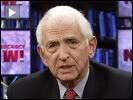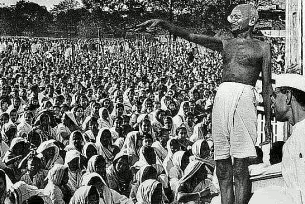
After WikiLeaks founder Julian Assange was arrested in London, an international group of former intelligence officers and ex-government officials released a statement in support of his work. We speak to one of the signatories, Daniel Ellsberg, the famous whistleblower who leaked the Pentagon Papers about the Vietnam War in 1971. "If I released the Pentagon Papers today, the same rhetoric and the same calls would be made about me," Ellsberg says. "I would be called not only a traitor—which I was then, which was false and slanderous—but I would be called a terrorist... Assange and Bradley Manning are no more terrorists than I am."
AMY GOODMAN: In December, Julian Assange was arrested in London on an international warrant to face sex crimes allegations in Sweden. While he was in jail in solitary confinement in London, Democracy Now! went to Cancún, Mexico, to cover the U.N. climate talks. While there, Dan Ellsberg joined us in our New York studio. Ellsberg is perhaps this country’s most famous whistleblower. In 1971 he leaked the Pentagon Papers, the secret history of the U.S. involvement in Vietnam. He’s been speaking out in support of Julian Assange and WikiLeaks. He spoke about the targeting of Julian Assange.
DANIEL ELLSBERG: Well, as I listened to Attorney General Holder on your program just now, I realize that he’s in the same position of that Attorney General Mitchell was in 40 years ago with the Pentagon Papers when they came out. We have an act of free speech, of free press, of informing the public, an act in search of a crime, in search of a law that would call it criminal. No one had ever been prosecuted for what I had done then, revealing top secrets. There had been many leaks in the past, then as now, and no one had ever been prosecuted. I was the first. The act they found was the Espionage Act, which was passed in 1917, was never intended to work as an Official Secrets Act, as in England, which would criminalize any release of classified information. But they tried it on me. I was faced with a possible 115 years in prison, which is the kind of sentence they would love to hang on Bradley Manning, who is accused of being the leaker in this case. We don’t know if he was, but I’m going to give him credit for it, since I regard it as a very admirable act, for which I thank him at this time. And if he’s—if the credit is not due, it’s due to the source, whoever that was.
So, I think, actually, what this is about, to a large extent, is trying to, once again, to instate the Espionage Act as if it were an Official Secrets Act, use it to cut down, close off unauthorized disclosures to the American public from inside the government, and also to accompany that with a legislative move to supplement it with an act that is explicitly an Official Secrets Act, one that clearly Congress intends to criminalize any release of classified information, such as the one you were just quoting to—in Cancún. I was interested that the recent release—Amy, you must have been reading it, actually, unlike most people, and found something of note in the cables that were released by the New York Times, given to them by WikiLeaks, and eventually by the source, about what Bradley Manning is reported to have said, the U.S. throwing its weight around against the poor countries of the world to exploit their resources, something that he said he was determined to expose to the American people.
AMY GOODMAN: In the letter that you’ve joined with others, very significantly among them Larry Wilkerson, the former chief of staff of then-Secretary of State Colin Powell, you are fiercely critical of the media. Talk about the role that it has played.
DANIEL ELLSBERG: Well, in this case, as in the Pentagon Papers, I do give the New York Times credit for working with these materials and presenting material to their readers. And in fact, there really—if they find a crime, or if they invent a crime or pass a crime—criminal law that would cover WikiLeaks, it will cover the New York Times, and you, Democracy Now!, and anyone who presents news that in part reflects leaks, unauthorized disclosures from within the government.
Actually, the wording of the Espionage Act, which, as I say, was not intended for this purpose, but the wording of it is so broad that it applies to readers of this classified information. If they are unauthorized possessors, which they are from the point of view of the government, then they can’t discuss it. They can’t join chat logs, let’s say, discussing it, and they have to, quote, "return" it, which is quite challenging with digital material like this. But they’d have to return their copy of the New York Times, I guess, to the Justice Department. That actually is in line with what the government has been saying right now, directing its employees that they cannot download WikiLeaks or the New York Times sites that reports the WikiLeaks onto their computers at work or at home—just where that leaves their family members, for instance. Is it possible that it could be discussed around the family table, if someone else has downloaded it?
We’re in an absurd position here with a close down of public discussion of official matters, very similar to that of China. In fact, I even wonder whether there’s a rule that absurd in China. And that’s the kind of information system, I think, that our leaders aspire to, and have for a long time.
AMY GOODMAN: Julian Assange has been the target of assassination and arrest calls from a number of U.S. politicians and commentators since the release of the diplomatic cables. This week, a Democratic Party consultant, Fox Business commentator Bob Beckel, called for illegally shooting Assange. This is what he said.
BOB BECKEL: We’ve got special ops forces. I mean, a dead man can’t leak stuff. This guy’s a traitor, a treasonous, and he has broken every law of the United States. The guy ought to be—and I’m not for the death penalty, so if I’m not for the death penalty, there’s only one way to do it: illegally shoot the son of a [bleep].
AMY GOODMAN: OK, now, that’s Bob Beckel. That’s Bob Beckel, Dan Ellsberg, on Fox, right? Bob Beckel, who was what? What was he? The campaign manager for Walter Mondale in 1984, in the presidential campaign of Walter Mondale?
DANIEL ELLSBERG: Well, it’s appalling. I didn’t remember that, but it’s appalling. You are reminding us that it’s not only Republicans like Sarah Palin and others, and Peter King, who will be a high—have high position in the House in the next term, who are calling for this kind of thing. In my case—I’m sure, by the way, that if I released the Pentagon Papers today, the same rhetoric and the same calls would be made about me at this time, the same material, same instigations. I would be called not only a traitor, which I was then, which was false and slanderous, but I would be called a terrorist, as a matter of fact. Now, that’s the word today for someone who is beyond the pale of any rights, of any rights of citizenship or any human rights, someone who can be just dealt with summarily like that. The reason for calling for illegal shooting, which is an odd and unusual call, is, as I said at the beginning, because our legal system, with its glorious First Amendment, we don’t have a law that makes it clearly illegal to do what—the truth telling that WikiLeaks and New York Times and Julian Assange has done. Assange and Bradley Manning are no more terrorists than I am, and I’m not.
And that is a—it’s appalling that our conversation after 9/11, in the last ten years, has reached a point where what Nixon did to me covertly can now be called for and actually done openly and very specifically. Nixon brought a dozen Cuban American émigrés, Bay of Pigs veterans, up from Miami to at least beat me up. The words were "incapacitate Ellsberg totally," which covers the word "kill," which, as their prosecutor said to me at the time, these guys, who were CIA assets, they don’t use the word "kill." They avoid it. They use words like "neutralize" and "eliminate" and "with extreme prejudice," "terminate," that sort of thing. They avoided the word "kill." I notice that the change now is that not only is that, which was a covert action, which actually was critical in bringing Nixon down because it was recognized as not only illegal, but really against American values in a fundamental sense, that has now become something you can talk about quite openly. And even the President can refer to special operations teams worldwide whose work is to capture or kill. The word "kill" is no longer avoided in these circles.
AMY GOODMAN: Pentagon Papers whistleblower Dan Ellsberg. And that does it for our show, but certainly not for our coverage of WikiLeaks.
Via democracynow.org








0 comments:
Post a Comment